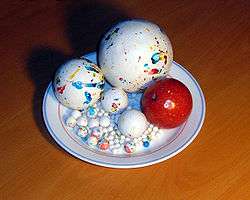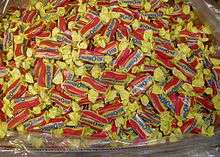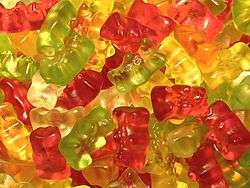Bulk confectionery

Bulk confectionery is a method of commercially dispensing multiple small units of confectionery, either in manufactured bags with a fixed number of units per container, or by the amount of mass placed in a bag. The former is typically used in vending machines, while the latter is more common in retailers that specialize in selling confectionery. Some shops allow the customer to mix multiple types of bulk confectionery in the same bag, then purchase the mixture based on the total weight.
In the United States, some of these confections are called penny candy and are sold by the piece in candy, soda fountain, and five and dime stores. In Britain, this type of candy is also referred to as pick 'n' mix or loose candy.
Loose candy is typically sold at kiosks, grocery stores and candy stores in the way that the customer picks up whatever kind, and how much, of candy they want (typically with a scoop) into a bag by themselves. The price of the candy depends on its weight, and the weighing can be either done by the customer or the seller.
History
In the United Kingdom, Woolworths high street stores were known for selling a range of pick 'n' mix sweets, usually from two separate ranges, with one side being provided by Candyking, and the other made up by Woolworths themselves. Towards the end of the company's life, they had only one big selection aimed at both adults and children.
The final bag of Woolworths Pick 'n' Mix was sold on eBay for £14,500.[1]
Since the demise of Woolworths, a number of different retailers have started providing pick 'n' mix to fill the niche, including W H Smith,[2] Wilko and supermarket chains Morrisons and Tesco, providing ranges from Candyking.
Because of inflation and the decline of the penny's value, penny candy is more often sold for a nickel or a dime.[3] Penny candy became less common in the US after the 1960s as shopping patterns changed and the number of small mom-and-pop shops and general stores was reduced. Some of the older stores sold penny candy as well as lunchmeat and newspapers.[4] A resurgence of sorts has taken place as new stores sell candy such as the 48 flavors of Jelly Bellies in bulk by weight.
Examples
- Apple drops
- Bit-O-Honey
- Bottle caps
- Bubble gum (e.g. Bazooka)
- Peppermint sticks
- Candy corn
- Caramels
- Atomic Fireballs
- Fruit sours
- Jawbreakers[5]
- Gummy bears
- Various gummis
- Hot Tamales
- Jelly beans
- Ropes of licorice
- Lollipops (suckers)
- M&M's
- Mary Janes
- Mentos
- Mints
- Pixy Stix
- Red Hots
- Skittles
- Smarties
- Sour balls
- Sugar Daddy
- Tic Tacs
- Tootsie Rolls
- Warheads
- Wax candy
- Penny candy types
 Peppermint and other candy sticks
Peppermint and other candy sticks A sucker
A sucker Plate of jawbreakers
Plate of jawbreakers Bit-o-Honey
Bit-o-Honey Gummy bears
Gummy bears
See also
- Dagashi, cheap candies and snacks in Japan
References
- ↑ Last ever bag of Woolworths pick'n'mix sweets sells for £14,500 on eBay | Mail Online
- ↑ WH Smith starts selling pick 'n' mix - Telegraph
- ↑ Funt, Peter. "Don't dump the penny" (12/05/2008). Monterey County Herald.
- ↑ "Downtown Allentown store lives up to name". Examiner.
- ↑ Brink, Julie. "Marking seasons with sweet memories". (Dec. 01, 2008). Centre Life.